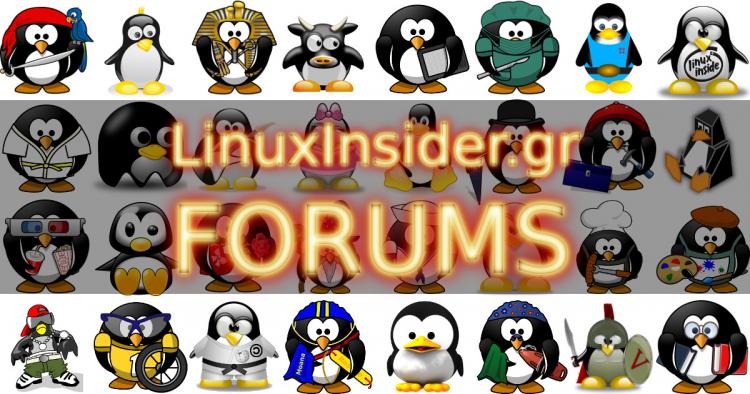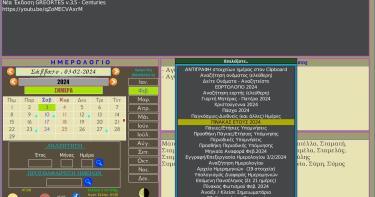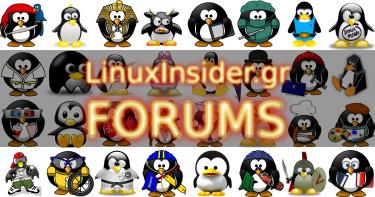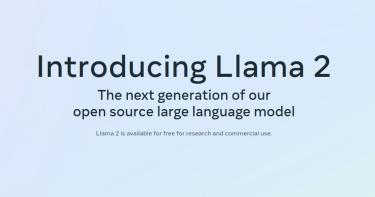Διάβασα ότι το openSuse 11.1 κυκλοφορεί με νέα άδεια χρήσης (EULA = End-User Licence Agreement = αυτό που πατάς "I accept" χωρίς να το διαβάσεις) που πρέπει να αποδεχτεί ο χρήστης όταν το εγκαθιστά, κ η οποία είναι πιο ελεύθερη από τις προηγούμενες άδειες:
http://www.linuxdevices.com/news/NS7027717600.html
Ορίστε κ η άδεια στα Αγγλικά:
http://en.opensuse.org/OpenSUSE_EULA
Είναι -λέει- παρόμοια με αυτή του Fedora κ αυτό θεωρείται πρόοδοσ. Έψαξα να βρω κ του Fedora (δεν ήξερα ότι είχε) κ δεν κατάφερα να τη βρω. Μοιάζει να έχει σβηστεί από παντού. Όποιος έχει Fedora κ μπορεί να την παραθέσει, ή τη βρει στο διαδίκτυο κάπου, θα του ήμουν ευγνώμων. Το μόνο που βρήκα ήταν ένα άρθρο από το WIki του Fedora, όπου ένας τύπος προσπαθεί να πει ότι το Fedora με την άδεια του, παραβιάζει βασικά άρθρα του General Pulic Licence (GPL):
https://fedoraproject.org/wiki/RoozbehPournader/EULA
Εγώ θα ήθελα να ξεκινήσω εδώ μια κουβέντα πάνω σε όλα αυτά τα ωραία, καθότι σα χρήστης του Debian, όλα αυτά μου φαίνονται "σκοτεινά".
Ορίστε κ η GPL, για να είμαστε πλήρεις:
http://www.gnu.org/copyleft/gpl.html
Πχ, έτσι για αρχή, όπως λέει κ ο άνθρωπος στο wiki του Fedora, ένα βασικό άρθρο της GPL αναφέρει ότι πρέπει να μπορείς να διανέμεις το αποτέλεσμα της δουλειάς σου ελεύθερα κ χωρίς περιορισμούς. Όταν όμως τα συμπαθή αμερικανάκια υποχρεώνονται από τη κυβέρνηση να μην διανέμουν software σε χώρες όπως το Ιράν (...), τότε έρχονται σε απ'ευθείας αντιδιαστολή με τη GPL, που λέει χαρακτηριστικά ότι αν κάποιος άλλος νόμος σε εμποδίζει αμετάκλητα να διανέμεις ελεύθερα τα προγράμματα κ τον κώδικα τους, τότε η μόνη λύση είναι... να μη διανέμεις καθόλου.
Δε λέω ότι θέλω να δω το τέλος του Fedora κ του openSuse, επιθυμώ το ακριβώς αντίθετο. Αλλά δεν έχει δίκιο ο τύπος στο wiki του Fedora; Δεν παραβιάζουν (πολλαπλά) τη GPL με τις άδειες χρήσης που σε βάζουν να αποδεχτείς κατά την εγκατάσταση;
- Συνδεθείτε ή εγγραφείτε για να σχολιάσετε








Σχόλια
Εφοσον το linux εχει ερθει πιο κοντα στον απλο χρηστη νομιζω οτι ειναι λογικο και επομενο να βλεπουμε ολο
και περισσοτερες distro να βαζουν αναλογες ΕULA ..Εξαλου το παιχνιδι εχει χοντρυνει και τα φραγκα ειναι πλεον πολλα, εδω μεχρι και ο FF πηγε να το γυρισει καπως, απο την στιγμη που οι δυο πιο δημοφιλης distros ειναι προιοντα εταιριων (canonicaλ, novell) ειναι λογικο οτι σκοπο εχουν το κερδος τους...εξου και τα LTS και οι συνεργασιες με την m$ για codecs ηχου, κ.ο.κ (βλ. moonlight), εδω ανοιξε το λογισμικο της ακομα και η sun στο νεο opensolaris (κατα το opensuse μαλλον).
Το θεμα αγγιζει και την κοινοτητα των developers νομιζω γιατι αναπτυσουν λογισμικο το οποιο υπαρχει κατω απο το logo μια εταιριας..η οποια μπορει αυριο μεθαυριο να βαλει και ενα EULA.Αναρωτιεμαι λοιπον μηπως τελικα οι εταιριες αυτες εκμεταλευονται την κοινοτητα αφου αυτη δουλευει παιρνοντας ως ανταλλαγμα καποια σεμιναρια (βλ.sun) ή και ευκαιριες εργασιας και μετα οι εταιριες βγαζουνε κερδη απο την δουλεια της κοινοτητας πουλοντας το λογισμικο σε εταιριες ή ισως και χρηστες...Ρωταω δεν ξερω;;;;!!!!
Τελικα η επιλογη μου να αλλαξω σε Debian ειναι πολυ σωστη πλεον και για εναν ακομη λογο τελικα....χαρης βεβαια την προτροπη σχεδον πλυση εγκεφαλου του gnu_labis. :-) :-)
Για να μην παρεξηγηθω εννοειτε οτι δεν θα θελα να "χαθει" το opensuse ή οσες αλλες θα εχουν EULA.
Σας δινω και λινκ με την κριτικη ενος χρηστη fedora για την νεα κατασταση και απο κατω βαζω λινκ μιας απαντησης απο καποιον
αλλο που λεει οτι η red hat καθοτι εχει εδρα στην Αμερικη εχει καποιους περιορισμους, εξου και η EULA
<pre> http://fedoraproject.org/wiki/RoozbehPournader/EULA
http://osdir.com/ml/redhat.fedora.advisory-board/2006-06/msg00027.html </pre>
Οσο για την αδεια του fedora..την βρηκα και την παραθετω..μοιαζουν πολυ..για να μην πω πως ειναι ολοιδιες.
βεβαια, παραθετω και λινκ απο το blog του gnome οπου καποιος πιστευει χωρις να ειναι σιγουρος οτι δεν ειναι δα και τοσο μεγαλη αλλαγη η προσθεση της EULA.
Και εδω θα δειτε ολες τις αδειες χρησης του Fedora..
Εγώ; Πλύση εγκεφάλου; Κάποιο λάθος κύριε, με μπερδεύετε με κάποιον άλλο μήπως; Σας ξέρω κ από χτες; :P
Άλλωστε, μια απλή προτροπή (διαρκείας) ήταν...
Κ αφού σου αρέσει, τι παραπονιέσαι; (όχι, το ξέρω ότι δεν παραπονέθηκες)
Επανερχόμενος στο "ζουμί", ορίστε το επιμάχο κομμάτι της GPL που έθιξα στο προηγούμενο post μου:
Κ ορίστε το κομμάτι της EULA του Fedora που έρχεται σε αντιδιαστολή με τη GPL:
Tο αντίστοιχο τμήμα από την άδεια του openSuse δεν το επαναλαμβάνω, γιατί είναι ίδιο με του Fedora. Η ερώτηση μου λοιπόν παραμένει: τα δύο παραπάνω κείμενα αντιφάσκουν ή είναι ιδέα μου (κ ιδέα του τύπου στο fedora wiki)?
Όσο για την απάντηση από πλευράς Fedora, μπράβο στο Naf που τη βρήκε. Τη διάβασα κ βασικά οι εκπρόσωποι του fedora λένε δύο πράγματα:
1) Ότι ο μόνος περιορισμός είναι σε χώρες που έχουν εμπάργκο, κ πάλι ισχύει για άμεση εξαγωγή, οπότε φαντάζομαι εννοούν ότι η Αμερική θα μοιράσει το Fedora πχ στην Ευρώπη κ από εκεί μπορεί να φτάσει κ στο Ιράν. Λεπτές οι γραμμές λέω εγώ...
2) Ότι η GPL δεν μπορεί να απαλλάξει κανέναν από τις υποχρεώσεις του απέναντι στο κράτος. Αυτό είναι κοτσάνα βέβαια, καθότι προφανώς ισχύει, και αυτό ακριβώς λέει κ η GPL: ότι αν άλλοι νόμοι σε εμποδίζουν, τότε η μόνη νόμιμη λύση είναι να μην το κάνεις καθόλου.
χμ.... σκεφτειτε το σεναριο σε καποια χωρα να υπηρχε καποιος νομος να απαγορευονται εντελως δια νομου οι messengers... συμφωνα με την GPL αν την παρουμε κατα γραμμα και λεξη προς λεξη, δε θα επρεπε να διαδωθει ουτε ενας open source messenger επειδη απαγορευεται η ελευθερη διανομη του στη συγκεκριμενη χωρα. (κι εκτος απο το υπερβολικο παραδειγμα, υπαρχουν απειρα πραγματικα παραδειγματα που θα απαγορευαν αρκετα πραγματα λογο τοπικων νομων καποιων χωρων).
Νομιζω λοιπον πως ο αλλος -ειδικα αν ειναι εταιρια παραγωγης λογισμικου εγκατεστημενη στην Αμερικη- εχει αρκετο δικιο να καλυπτει τα νωτα του, φτανει οι eula ναπαραμεινουν σε αυτο το αθωο επιπεδο και να μην ενσωματωθουν και τιποτα αλλα καλουδια
Νομίζω ότι το μπερδέψαμε λίγο. Αν σε κατάλαβα καλά brave, λες ότι αν μια χώρα απαγορέψει τους messengers, τότε κανείς δεν μπορεί να φτιάξει GPL messenger. Αν αυτό πράγματι είπες, νομίζω ότι δεν έχεις δίκιο. Αν εγώ γράψω ένα τέτοιο πρόγραμμα με άδεια GPL, προκειμένου να καλύψω την άδεια που χρησιμοποιώ, δεν πρέπει να το αρνηθώ σε κανέναν. Κ ούτε πρόκειται. Αν πχ η Κίνα εφαρμόζε ένα τέτοιο νόμο που απαγόρευε τους messengers, τότε το μπαλάκι δεν πάει σε μένα που έγραψα το πρόγραμμα κ ζω στην Ελλάδα, αλλά στον Κινέζο χρήστη. Εγώ το ανεβάζω στο site μου στο internet κ δεν το αρνούμαι σε κανέναν, κοινώς είμαι σε πλήρη συμφωνία με τη GPL. Ο Κινέζος ας αποφασίσει αν θα το κατεβάσει, ή θα παραμείνει νόμιμος.
Ενώ, στα όσα αναφέρθηκαν παραπάνω, το πρόβλημα είναι ότι ο προγραμματιστής (η Fedora πχ), βρίσκεται μέσα στη χώρα (ΗΠΑ) που του επιβάλει να μην διανέμει ελεύθερα λογισμικό προς πάσα κατεύθυνση, κ αυτό γεννά το πρόβλημα.
Έγινα κατανοητός; Είμαι σωστός σε αυτό που λέω;
ΥΓ: Καλά Χριστούγεννα, μέρα που'ναι!
ναι καπου εχεις δικιο γιατι ετσι η ιδια η αδεια του fedora ερχεται σε αντιθεση με τη GPL κι οχι η cia πχ που θα εβαζε φιλτρα...
Το προβλημα ειναι πως ζουν σε παραξενη χωρα ομως και δεν ξερω κατα ποσο μπορουσαν να κανουν κατι διαφορετικο
τυχαια επεσα πανω σε αυτο το κειμενακι που εξηγει πως να κανετε την αναγκη φιλοτιμο...Το παραθετω προς συμπληρωση της συζητησης χωρις να θελω ιδιεταιρως να πω κατι με αυτο.
OpenSUSE Henceforth Without EULA
Nov 27, 2008
Free Linux distro openSUSE will from now on release without an end-user license agreement. The project will be using the same license notice as their competitor Fedora.
Software installation commonly involves completing an End-User License Agreement (EULA), mostly with just mouse clicks, but often requiring registration of personal data. The open source openSUSE has been no exception. Things will change as of version 11.1, however. "The days of agreeing to a click-through EULA for openSUSE are over!" says community manager Joe "Zonker" Brockmeier in his Spotlight forum. A click-through EULA will be replaced by a simple license notice. According to Zonker, users will be made aware of the rights associated with the free and open source software (FOSS) license notice that will be displayed. The inclusive package from openSUSE consisting of the OS itself together with numerous free software packages will be licensed under GNU General Public License version 2 (GPLv2). Additionally third-party-software will be under their individual licenses. Also new is that the main DVD will contain only software that users can distribute freely. According to Zonker, "We now have a license that presents no obstacle to redistribution, and no obstacle for modification."
The similarity of openSUSE's licensing with that of Fedora's is no coincidence. Despite their competition, they still have Linux in common. Consider their histories. OpenSUSE is Novell's version of a free Linux that is the code basis for the commercial SUSE Linux Enterprise Server (SLES), while the free Fedora project plays a similar role for Red Hat’s RHEL. At least the leaders of the respective communities felt it was
time to collaborate on licensing. Hence, Zonker was quick to thank Fedora project leader Paul Frields for his cooperation.
Zonker cites a number of reasons for the FOSS licensing choice. One is that there was no point in reinventing the wheel, another is that Fedora offered the license freely. "Fedora’s license has worked for them, and there’s no reason it wouldn’t work for us. Reuse is one of the strengths of our community, after all," he explained. He also advised other projects to adopt a similar strategy, perhaps alluding to a recent licensing brouhaha at Ubuntu where users were faced with the possibility of having to address a Mozilla EULA during installation. Mozilla's decision was short lived. After some protest, it retracted the EULA plan (see article).
The issue has been settled at openSUSE, and Zonker promises that trademarks will come next: "We are also working on trademark guidelines that clarify how and when the openSUSE marks can be used, and we’ll be releasing those shortly." Zonker is happy with the new licensing for openSUSE 11.1 and ends emphatically with "The EULA is dead, long live the new and improved license notice!"</pre>